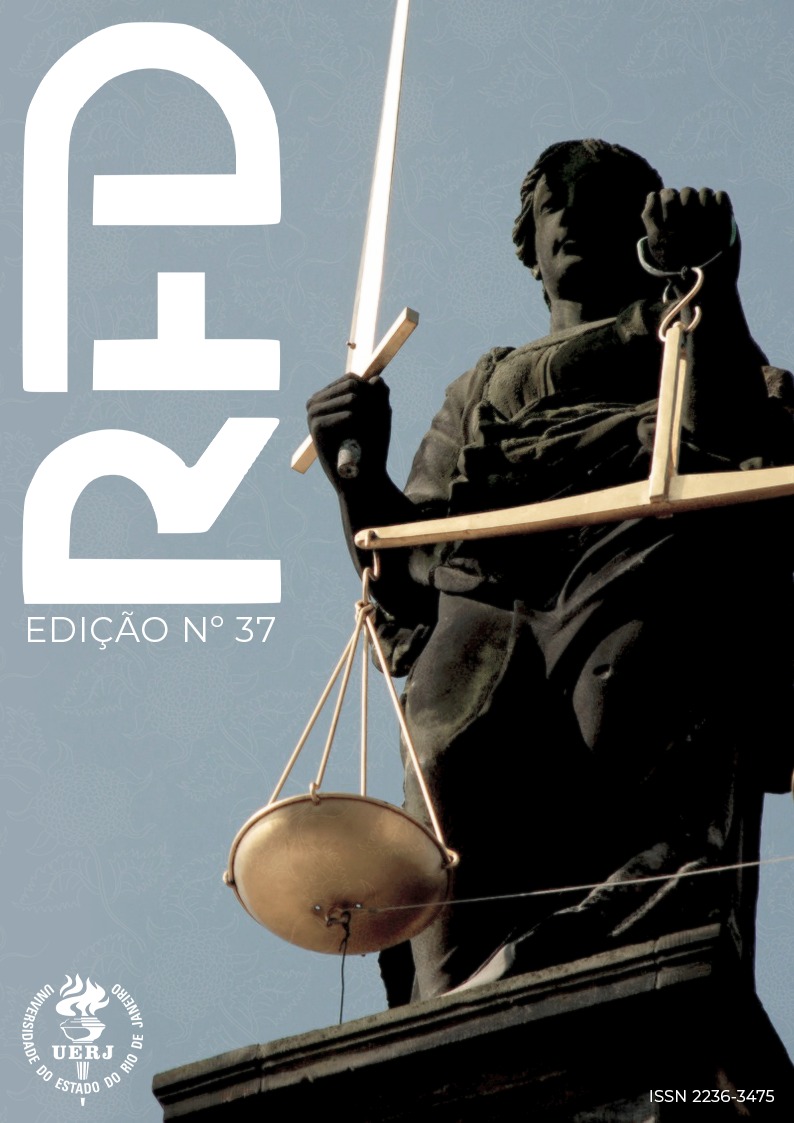O ESGOTAMENTO DOS RECURSOS INTERNOS E A PROTEÇÃO DE OBRIGAÇÕES DE DIREITOS HUMANOS ERGA OMNES PARTES PERANTE A CORTE INTERNACIONAL DE JUSTIÇA Considerações sobre legitimidade processual no julgamento das exceções preliminares em Ucrânia v. Rússia
DOI:
https://doi.org/10.12957/rfd.2020.50452Keywords:
Corte Internacional de Justiça. Legitimidade processual. Direitos humanos. Obrigações erga omnes partes.Abstract
O presente artigo pretende analisar a decisão da Corte Internacional de Justiça (CIJ) sobre as exceções preliminares na controvérsia entre Ucrânia e Rússia, com o objetivo de avaliar: 1) se o caráter erga omnes partes das obrigações discutidas pode ser entendido como base da legitimidade processual da Ucrânia no caso e, 2) em caso positivo, se a decisão da Corte implica a desnecessidade do esgotamento dos recursos internos quando a controvérsia se refere a obrigações de direitos humanos que, embora sejam devidas a indivíduos, são também erga omnes partes. Busca-se, em suma, avaliar se a decisão da CIJ pode ser interpretada em favor da proposição de que a regra do esgotamento dos recursos internos não é aplicável em face de reclamações relativas a obrigações erga omnes partes, contrariamente ao que sugere o art. 48, §3º, dos Articles on the Responsibility of States for Internationally Wrongful Acts da Comissão de Direito Internacional. Para tanto, serão analisadas as possíveis bases de legitimidade processual da Ucrânia no caso e qual destas foi efetivamente considerada pela CIJ. Em seguida, será analisada a jurisprudência da Corte quanto à aplicação da regra dos recursos internos e à legitimidade via obrigações erga omnes partes. Com base nessas considerações, será então examinada a decisão em Ucrânia v. Rússia, verificando-se se é possível entendê-la como rejeitando a aplicação da regra dos recursos internos sempre que obrigações erga omnes partes são o objeto da controvérsia.
10.12957/rfd.2020.50452
Downloads
Published
How to Cite
Issue
Section
License
Copyright
oArticles published in the Revista da Faculdade de Direito da UERJ (RFD/UERJ)
The copyrights of the published articles belong to the Revista da Faculdade de Direito da UERJ (RFD/UERJ). Total or partial reproduction of the articles is allowed as long as the source is cited.
oPartial reproduction from other publications
Submitted papers that contain parts of text extracted from other publications must obey the specified limits to ensure originality of the submitted work. Plagiarism in all its forms constitutes unethical behavior and is unacceptable.
It is recommended to avoid reproduction of tables and illustrations from other publications. The article that contains reproduction of one or more tables and/or illustrations from other publications will only be sent for analysis if it is accompanied by written permission from the copyright holder of the original work for the specified reproduction in the Revista da Faculdade de Direito da UERJ (RFD/UERJ). The permission must be addressed to the author of the submitted work. Under no circumstances will the Journal of the Law School of the State University of Rio de Janeiro (RFD/UERJ) and the authors of the papers published in this journal transfer the rights thus obtained.
•The refused studies will be returned to the authors, if asked.

The Revista da Faculdade de Direito is licensed under a Creative Commons Atribuição 4.0 Internacional License.
This work is licensed under a Creative Commons 4.0 Attribution-No Derivation License.
This license allows copying and redistribution of the material in any medium or format for any purpose, even commercial, provided that the original authorship is acknowledged.










